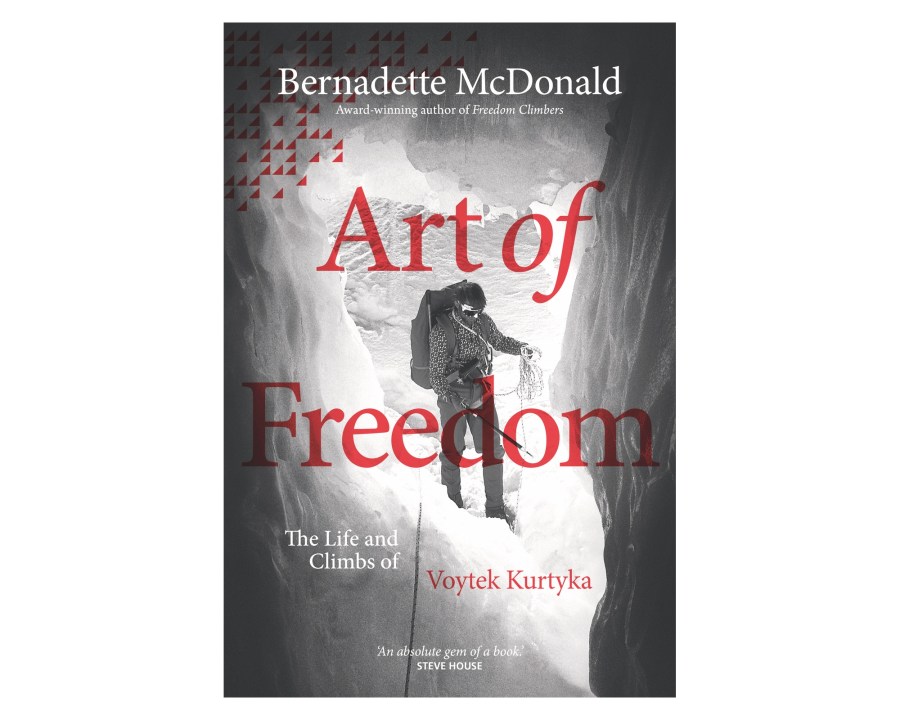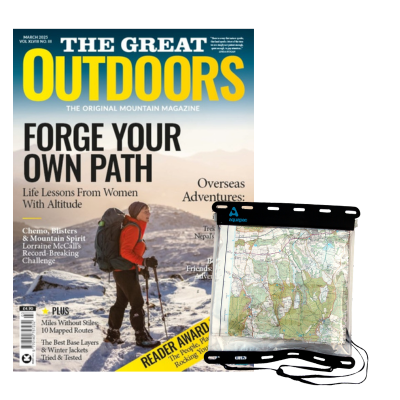‘A completely absorbing journey’ – David Lintern reviews the biography of a little-known but radical Polish alpinist
This review was first published in the November 2017 issue of The Great Outdoors
Published by Vertebrate in the UK and Rocky Mountain Books in Canada, Art of Freedom addresses the life and career of Polish mountaineer Voytek Kurtyka, little known in the mainstream but revered by fellow alpinists.
Voytek might be best known to British readers as the partner of Alex MacIntyre on big, brave first ascents in Afghanistan, but his career extends far beyond. Those early adventures did seem to set a pattern though. Impetuous, highly technical, often without permits, Voytek comes across as a perplexing mix of post-war macho bravado and European intellectual aesthete. At first, he’s a bolshy young upstart, funding his expeditions through an illicit smuggling business. Read in the context of pre-Solidarity communist Poland, his restlessness both on and off the mountain makes total sense.
Despite his earnest image, he has a light touch. He wants to commune with beauty, not death
As his reputation grows he avoids media attention like the plague, dismissing the race to grab 8,000m summits as gross egotism in his peers. Instead he dedicates himself to often obscure, fine lines, becoming a silent ambassador for the virtues of modern alpinism: small, tightly knit teams, first ascents on big faces and long ridges, no fixed ropes or other support – the art of suffering as well as freedom.
As told here, the later climbs – the traverse of Broad Peak and the ‘night naked’ ascents of Cho Oyu and Shishapangma in particular – are completely gripping and beyond audacious: who else would think of climbing new routes up 8K hills at night, in a single push, with no stove and no bivi gear, and only 30m of rope, 4 pitons, the same number of chocolate bars and 3 bottles of fluid? In this way he strives to achieve total intimacy with the elements and terrain, a style of climbing he calls ‘unleashed’.
But the contradictions remain intact. On the one hand, Voytek is the embodiment of climbing’s avant garde, determined to push the envelope and some sort of zen master to his peers. On the other, he plays it safe, retreating from several climbs while his teammates try to force their will on the mountain. His approach is always elegant, considered and respectful, and his safety record impeccable. Despite his earnest image, he has a light touch. He wants to commune with beauty, not death.
His relationships with fellow climbers seems to matter more as time goes on, but while the mountains are an enduring love affair, humans both at home and on the hill are more complicated. In particular, interviews with his children are honest and revealing, and his friendships with Erhard Loretan and Jerzy Kukuzka are explored fully but with empathy.
Voytek’s story is told sensitively and without fuss by climbing historian Bernadette McDonald, a writer whose previous work on the history of Polish alpinism makes her the perfect storyteller here. Until the final chapters, when the story of the climber and the story of the book converge, she does the subject justice and keeps her head down, letting the man, myth and legend do his own talking. We get some reflection in the earlier chapters, but mostly it’s Voytek’s own, and the book is certainly stronger for it. McDonald seems to have gained his trust slowly during the course of the book, and a picture of this complex and multifaceted character emerges gradually. Thankfully, we’re not rushed through.
Even for non-climbers, there is plenty to enjoy and much to admire here
Voytek’s otherworldly perfectionism does at times come across as a form of egotism, but in later life he has learnt to downclimb his own pedestal and achieve a degree of contentment. As part of that evolution, he returns to his rock climbing beginnings nearer home, and leaves the Himalaya behind. The personal challenges didn’t stop – even late in his career, he continued to establish solo first ascents that have yet to be repeated.
But it seems a measure of the man that after refusing the Piolet d’Or Lifetime Achievement Award several times, his acceptance of it in 2016 marks a growing self-acceptance and humility. On anyone else, acceptance might look like plain vanity, but his internal conflicts concerning the dangers of fame are shown to be Catholic in their intensity. Again, McDonald handles the balance of character with care.
Ultimately Voytek Kurtyka retains something of his enigmatic status, but Art of Freedom is a completely absorbing journey about the most romantic and creative of mountaineers. Even for non-climbers, there is plenty to enjoy and much to admire here.
Published in the UK by Vertebrate Publishing (hardback, £24)








